A resource highlighting interior enforcement practices within the Harris county region of Houston, Texas.
This resource compares immigration enforcement in Texas before Trump’s inauguration on January 20, 2025 with the policies Trump has instituted since he has taken office. Our analysis shows that Governor Abbott’s immigration enforcement policies led the way for Trump’s actions. Texas has served as experimentation grounds for hateful and sweeping immigration enforcement policies which were quickly adopted by Trump 2.0 for the national level and have also infected other states who have enacted Texas copycat laws and policies. Our analysis below is a mere snapshot of the Texas and federal immigration enforcement policies that are currently in place.
The IJ roundtable, composed of 71 former Immigration Judges and former Board Members and Appellate Immigration Judges of the Board of Immigration Appeals issued a letter highlighting their concerns about HB 1554 and the importance of having legal counsel in immigration proceedings.
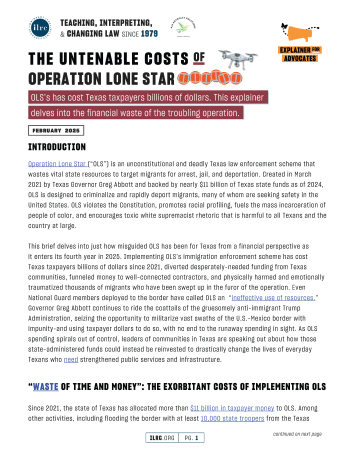
Operation Lone Star (OLS) is an unconstitutional and deadly Texas law enforcement scheme that wastes vital state resources to target migrants for arrest, jail, and deportation. To date, nearly $11 billion has been spent on OLS. This policy brief delves into how misguided OLS has been for Texans from a financial perspective and provides recommendations for how OLS funds could be reinvested to support the everyday lives of Texans who need strengthened public services and infrastructure.
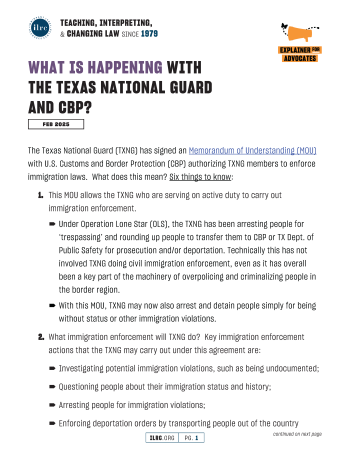
CBP has signed an agreement delegating immigration enforcement authority to the Texas National Guard. Under the President's "mass influx" declaration, local and state law enforcement agencies may take on civil immigration enforcement authority that they wouldn't otherwise have. These specific powers are designated in a Memorandum of Understanding signed with CBP. This quick explainer highlights what this MOU says, what this means for Texas, and how it relates to Operation Lone Star.
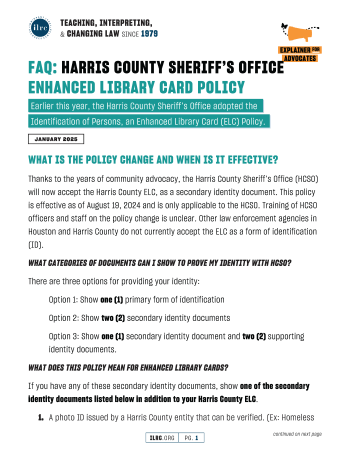
Thanks to the years of community advocacy, the Harris County Sheriff’s Office (HCSO) will now accept the Harris County ELC, as a secondary identity document. This policy is effective as of August 19, 2024 and is only applicable to the HCSO. Training of HCSO officers and staff on the policy change is unclear. Other law enforcement agencies in Houston and Harris County do not currently accept the ELC as a form of identification (ID).
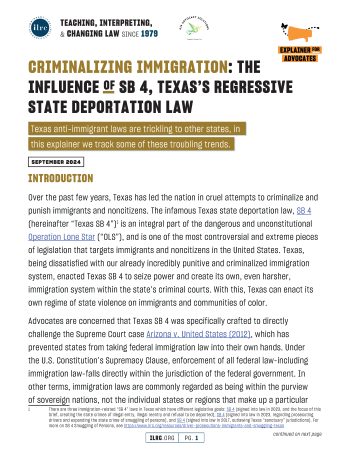
Over the past few years, Texas has led the nation in cruel attempts to criminalize and punish immigrants and noncitizens. The infamous Texas state deportation law, SB 4, is an integral part of the dangerous and unconstitutional Operation Lone Star and is one of the most controversial and extreme pieces of legislation that targets immigrants and noncitizens in the United States. In 2024, state legislatures across the country have proposed bills that further expand the already vast and punishing criminal-legal system by requiring local law enforcement to carry out federal immigration enforcement and creating new crimes that punish the act of crossing into a state without legal status. Unless stopped, Texas SB 4 and its ilk could herald a regressive wave of anti-immigrant state legislation that will endanger noncitizens and U.S. citizens across the country–to a greater extent than occurred in 2010 after the passage of Arizona’s infamous racial profiling law, SB 1070. This report looks at the copycat policies being put forth across the country.
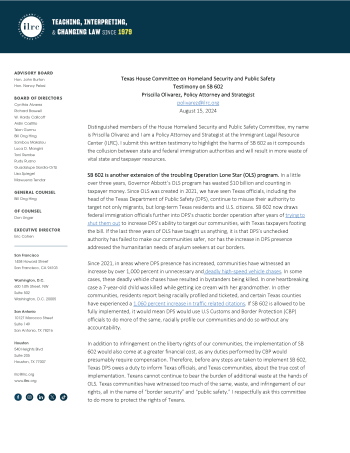
ILRC comments on Texas House Committee on Homeland Security and Public Safety Testimony on SB 602.
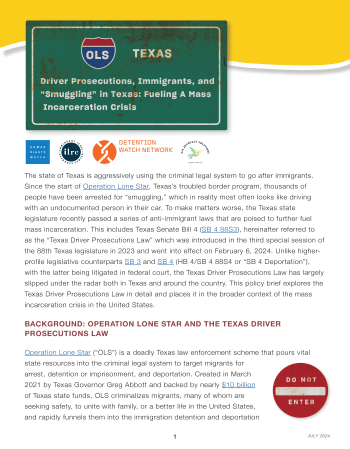
Texas authorities have expansively interpreted a 2024 law that imposes a 10-year mandatory minimum sentence on people convicted under the state's smuggling law to include giving rides to undocumented people, The Immigrant Legal Resource Center (ILRC), Human Rights Watch (HRW), Detention Watch Network (DWN), and AJA Advocacy Solutions said this report highlighting the law’s harm. The brief states that most people prosecuted for smuggling in Texas are young US citizens. Texas law enforcement officers have a troubled track record with identifying alleged smugglers, and now the state has raised the stakes of each arrest significantly.
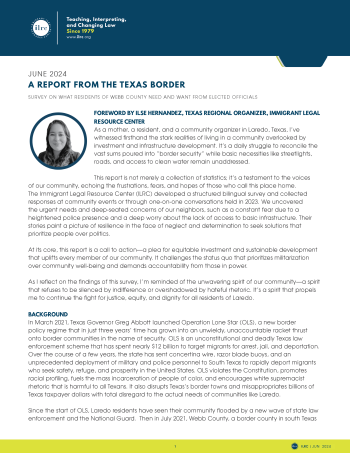
While politicians enact and reenact their reckless border theatrics, the ILRC surveyed border residents about their actual needs and how the influx of law enforcement efforts has affected them. We found that while the state of Texas spends more and more money on police and prisons, local governments are starved of funding and communities lack the most basic services, including clean water, paved roads, and street lights.